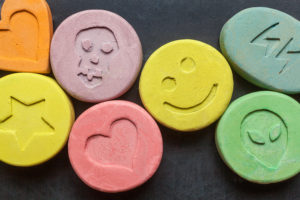What Is a MDMA Use Disorder?
MDMA addiction treatment may be needed if you or a loved have the symptoms outlined in this article. MDMA is short for methylenedioxymethamphetamine, but it is most commonly known as molly or ecstasy. People take molly for the feeling of euphoria and stimulation it produces. Molly increases serotonin, dopamine, and norepinephrine in the user’s brain and body. Serotonin and dopamine cause the euphoric feeling, while dopamine and norepinephrine increase energy and heart rate.
The United States Drug Enforcement Agency classifies ecstasy as a Schedule I controlled substance. This means that it has a high potential for physical dependence and is believed to have no medicinal purpose. The American Psychiatric Association classifies ecstasy under hallucinogen use disorders.
The popularity of molly as a club or rave drug has led to a very high amount of users. Oakvine Recovery Center recognizes its dangers and we can create a treatment plan tailored specifically for you.
What are the Symptoms of Molly Use Disorder that may Require MDMA Addiction Treatment?
A MDMA addiction treatment center may be needed if you or a loved one shows some of the visible effects noted below from heavy, continued usage. Some of these signs are:
- A person spends the majority of their time using ecstasy, trying to obtain it, or recovering from using it
- Abandoning formerly enjoyed activities, such as time with friends or hobbies
- Not fulfilling obligations, whether personal or professional, because of MDMA abuse
- Becoming anxious or distressed in ways that interfere with daily functioning
- Strong desire to use ecstasy in a range of situations, from social activities to stressful situations
- The person has expressed the desire or need to stop using molly, but fails to do so
- MDMA causes issues with friends, family, work or school, but the person continues to abuse molly anyway
- Similarly, the person continues ecstasy abuse despite knowing that it is causing physical and psychological problems
What Are the Long-Term Effects of a Molly Use Disorder?
Prolonged abuse of ecstasy has a number of recognized physical, psychological and mood effects, such as:
- Increased body temperature. Molly affects the sympathetic nervous system and speeds up body functions. It also causes excessive sweating, putting the user at risk of dehydration and overheating.
- Cardiovascular problems. Ecstasy abuse can high blood pressure, irregular heartbeat, and higher chances of having a stroke or heart attack.
- Liver and kidney damage. A number of patients with a molly use disorder have suffered liver and kidney damage as a result.
- Damage to teeth. While using MDMA, people often grind their teeth, causing permanent wear.
- Brain damage. Research shows that people with an ecstasy use disorder cause damage to the parts of their brain that control memory, attention, and problem-solving.
- Psychological problems. The withdrawal phase of recovery from a molly use disorder often involves issues such as trouble sleeping, depression, problems concentrating, and tiredness.
- Mood swings. Once someone with an addiction to MDMA stops using it, their brain expects euphoria and then reacts to the lack of it through aggression, impulsive behavior, and anxiety.
How Does Oakvine’s MDMA Addiction Treatment Center Treat a Molly or Ecstasy Use Disorder?
Oakvine’s PHP drug rehab program and IOP drug rehab program treats dependence on molly and ecstasy in the way that makes the most sense for you. Every person suffering from a molly use disorder has their own story, and we’re here to help you write the next chapter. Some treatments include:
- Cognitive behavior therapy. Most users are triggered by certain situations, whether those are social gatherings, certain friends, or stress. We help you recognize them and build mechanisms to address them and stay sober.
- Age-specific treatments. Oakvine recognizes that the demographic at highest risk of molly use disorder are ages 18-24, so we have highly skilled therapists who understand how to engage and help these patients.
- Group therapy. Millions of people abuse MDMA and Oakvine’s counselors have years of experience helping patients share with others and build strong support groups.
- Co-occurring therapy. Patients with a molly use disorder also may have anxiety, personality disorders, depression, and other unique mental health challenges. As a result, these patients require a very specialized approach to treat both disorders concurrently.
- After-care treatments. If your molly use disorder has interfered with your job, school, or other obligations, we can help you get back on the right track with customized treatments.
Start your Recovery Today
Oakvine can help. Trust our professional staff to select the best course of action to help you recover from your MDMA use disorder. Call our admissions team at (877) 255-6890 for a 100% confidential conversation on getting your life back under control.




